The 9 Scrum Books Every Scrum Master Must Read
For Scrum masters who are just starting out, Scrum books are essential for reference, but their use doesn’t end there. As new servant-leaders gain experience, the best Scrum books can remain go-to sources of inspiration for coaching and leadership.
What I looked for in Scrum books for this roundup was help with the human side of Scrum, rather than just another version of the Scrum Guide. I wanted insight into how to deal with the real-world problems Scrum masters face trying to help teams collaborate.
These are the books that did not disappoint.
Scrum: The Ultimate Beginner’s Guide To Learn And Master Scrum Agile Framework by Hein Smith
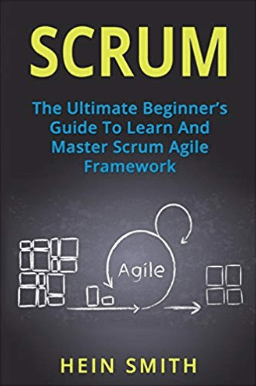
If you’re looking for a Scrum book that has complete beginners in mind, this would be my top pick.
Smith places Scrum within the context of agile, so readers get a healthy introduction to the “why” of scrum before learning the “what.” It’s a concise book written in accessible language that gives readers a quick grasp of Scrum.
At about 40 pages long, it’s not deep. I wouldn’t advise someone to fill in their knowledge gaps with this book as much as I would use it as a quick primer. There is enough detail to understand the concepts of Scrum, plus some peripheral information on things like non-core Scrum roles, agile estimation techniques, and scaling Scrum.
So, it’s nice to have as a loaner on your shelf. If someone at your company is foggy about Scrum, here’s a book they can read in an hour or two that sums up the need-to-know basics and shows them why your team is having so much fun every morning.
The Great ScrumMaster: #ScrumMasterWay by Zuzana Šochová
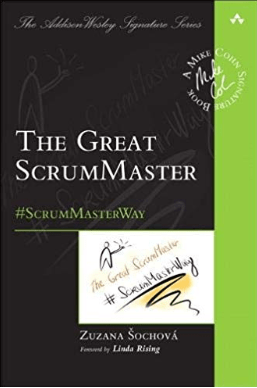
This is another scrum book that works well as a starting point for Scrum masters and agile coaches. It’s personal, encouraging, and full of well-organized information geared toward novices. You can read this book in a weekend and come away with some useful insights about what it means to be a Scrum master.
For example, you know that Scrum teams are supposed to be self-organizing, but what does that mean? What does healthy self-organizing look like and where do teams draw boundaries?
The most valuable thing about this book is that it helps you develop professionally. Soft skills are crucial to becoming a great Scrum master, and Šochová includes exercises that help readers figure out where they stand. Are they actually a servant leader? Which competencies do they have? Šochová is a great coach. She helps Scrum masters track their progression in a way I haven’t seen in other Scrum books.
She also includes chapters on team building and practical advice for difficult team behaviors. Her notes and examples on perennial issues like defensiveness and stonewalling could be useful even for advanced Scrum masters trying to fine-tune team dynamics.
Building a team is different from building software, Šochová notes—she started off her career as a developer before she became a Scrum master and trainer—so she has great insights into the different challenges faced by developers (who build great software) and Scrum masters (who build great teams) and how they can best work together.
Scrum: The Art of Doing Twice the Work in Half the Time by Jeff Sutherland
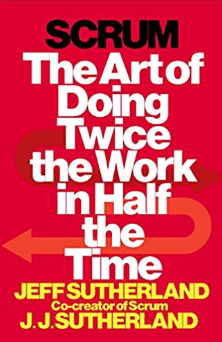
Here’s a book about Scrum that got traction both in and out of tech. Part of its wide appeal is the lack of jargon and technical language. Instead the book’s lessons are structured by the stories Sutherland tells about implementing Scrum.
The narrative is exciting compared to your typical Scrum book. No outside knowledge of software history is required for you to enjoy the convoluted development debacles, near-misses, and out-of-the-park victories that Sutherland chronicles.
Just to give you a sense of what you’re in for, here’s the opening to Chapter Six, titled Plan Reality, Not Fantasy:
“Hey, Jeff, we have a problem.”
That’s how a lot of my phone conversations start. People have backed themselves into a corner, and they pick the phone up and call me.
For some readers, the book might be a little too narrative-driven, i.e. too much about Sutherland. But for me, the story structure made the information more memorable.
A lot of what he focuses on are where really smart people got things really wrong—not because they weren’t trying or gifted enough, but because they were setting themselves up for failure without realizing it. Scrum masters can use these stories as a working perspective on the thorny situations they face.
My favorite chapter has to do with the role that happiness plays in individual and team success. Sutherland gives Scrum masters easy ways to start quantifying happiness and making a positive impact on the team’s emotional well-being.
Sutherland was a fighter pilot in the US Air Force—his take on happiness is not feel-good or new-age in the slightest. It’s exceedingly practical, and his viewpoint on the subject can be really helpful in getting people onboard with this critical, though often overlooked, topic.
Essential Scrum: A Practical Guide to the Most Popular Agile Process by Kenneth S. Rubin
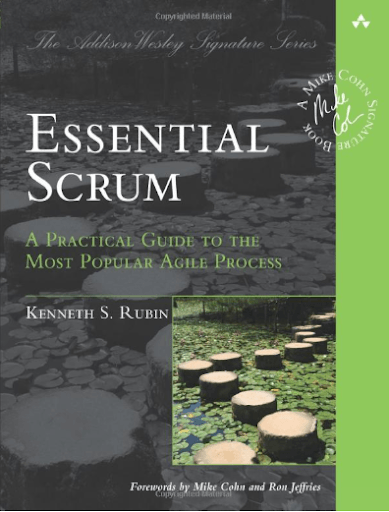
This is about as close to a one-stop-shop as any Scrum book out there. There is a real depth of analysis to every topic. The result is that Scrum masters new and old will find value in Essential Scrum.
When I say there is a lot of detail, I mean it. Rubin dedicates a 17-page chapter to a full-bodied definition of “the sprint.” The information is broken down intuitively, there are plenty of infographics, and by the end of it, you’ll know more about the essential characteristics of sprint than you knew existed.
Each chapter is this thorough, which makes the book a serious time investment. But it’s worth it for the payoff.
Another example is his overview of the product backlog, which gets into backlog grooming and flow management. From there, Rubin spends the next two chapters digging deep into estimation, velocity, and technical debt.
All of this book is well written. You’ll come away with a wealth of Scrum knowledge. For experienced Scrum masters, this book will complement your day-to-day issues better than any of the breezier guides on this list.
Studying for your Scrum master certification? Essential Scrum is a must-read.
Scrum Mastery: From Good To Great Servant-Leadership by Geoff Watts
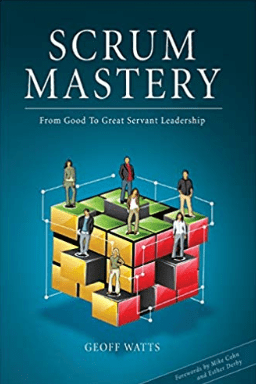
The title to this Scrum book is spot on. Watts dedicates every page to helping good Scrum masters become great. For Watts, there is always more to be gained—be it in a meeting or during a sprint—and the great Scrum master helps their team uncover and capitalize on this hidden potential.
The book comes alive as you read about the different teams Watts has worked with over the years. It’s not hard at all to learn from their experiences. His lessons help put flesh on the bones of Scrum theory.
Whether you are just beginning your journey as a Scrum master or agile coach or you feel like your practice has started to stagnate, you will find loads of tips for getting unstuck.
The book is extremely useful for dealing with the human dilemmas Scrum masters encounter. For example, what does a cross-functional teammate look like? How do you train people to be more cross-functional? How do you deal with accountability in a self-organizing team? The answers to these questions change depending on the team, and Watts helps you approach them in the right way.
He breaks the book down into the characteristics that make a great Scrum master: respected, disruptive, enabling, and so on. Each aspect is its own chapter.
This makes it different to most Scrum books, which are organized around the basic framework of ceremonies, roles, and artifacts. As long as readers understand that, though, they shouldn’t have any problems following along.
Learning Agile: Understanding Scrum, XP, Lean, and Kanban by Andrew Stellman & Jennifer Greene
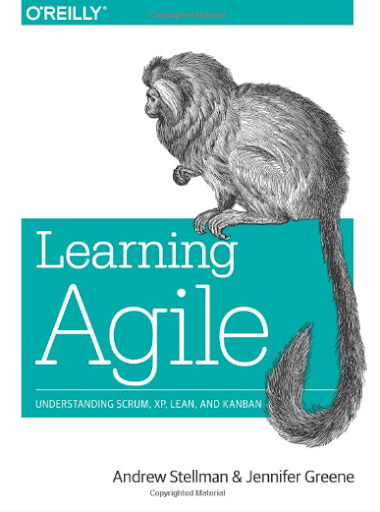
Looking for a wider overview of agile that includes more than just Scrum? I definitely recommend Learning Agile.
First of all, the section on Scrum is fantastic in its own right. Stellman and Greene get into the “why” in every sentence. You get a strong sense of the differences that separate Scrum teams from effective Scrums teams.
And it’s well supported by examples, exercises, and analyses that help prepare you for real-life scenarios.
On top of that, you get a similarly solid treatment of agile, XP, Kanban, and Lean. This is invaluable to Scrum masters, especially those who are with a team or company that is just starting to adopt Scrum. A broader understanding of other agile methodologies will help a Scrum master make sense of their team’s diverse experience.
For example, if one of your testers worked with XP for years before joining this Scrum team, they’ll have a different but no less valid outlook on how to approach problems.
Those outside the team, too, may be a little confused about the difference between Scrum and other agile methodologies. A Scrum master with good overall knowledge the agile neighborhood would be a go-to resource when there’s confusion about where to apply different methods.
My favorite section goes in depth about each Scrum value, drawing on examples from elsewhere in the book. This shows just how relevant Scrum values are to every aspect of healthy team-building and continuous product development.
Bonus Scrum books
The above are my all-time favorites. But here are three more worth checking out if they didn’t quite quench your thirst for Scrum knowledge.
Coaching Agile Teams: A Companion for ScrumMasters, Agile Coaches, and Project Managers in Transition by Lyssa Adkins
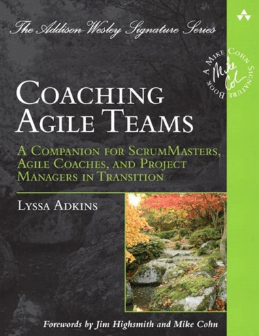
The only reason this isn’t on the official list is because both Šochová and Rubin’s Scrum books are from the same series. Adkins book is tremendous, though. I recommend virtually all Addison-Wesley books about Scrum.
A Scrum Book: The Spirit of the Game by Jeff Sutherland
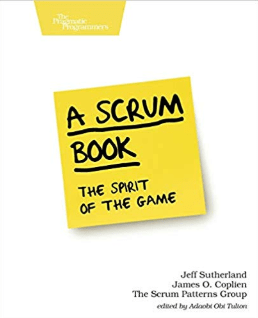
Could this be the 2019 stocking stuffer for Scrum masters? It’s the latest Scrum book from Jeff Sutherland and the credits include a laundry list of Scrum all-stars.
Agile Retrospectives: Making Good Teams Great by Esther Derby & Diana Larsen
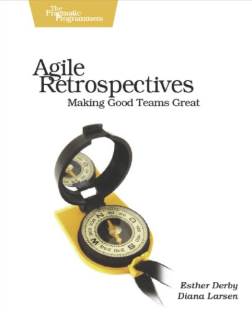
Oldie but a goodie. It’s packed with both theory and practical tips on getting the most out of this crucial Scrum ceremony.
Got a favorite Scrum book I didn’t include here? Drop it in the comments!

